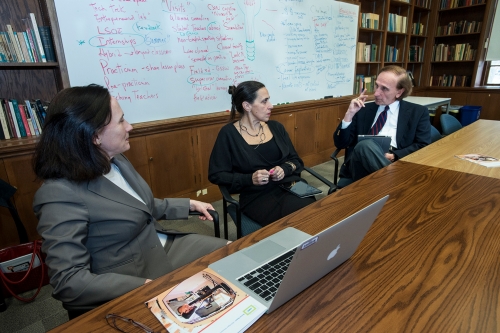
By
Picture a lecture hall — but without the lecture.
More than 100 students arrive to class ready to participate in discussions because they have already viewed the lecture and supplemental materials online. The professor, able to engage more thoroughly on each topic, determines mastery of the subject through real-time polling — instant pop quizzes, of sorts — that students take on handheld devices they click throughout the discussion. The professor gains immediate data on what material needs to be reviewed and modifies the lesson plan.
That scenario may be closer to reality at Boston College than you think.
A movement is underway at the University to analyze classroom technology as a means to improve the interactions between professors and students, through the Academic Innovation Programs (AIP) initiative led by the Academic Technology Advisory Board. The board, a committee of the Office of the Provost, is currently gathering comments and suggestions from faculty through group meetings. The open comment period — which ends next month — will help establish programming that could be implemented as soon as fall 2013.
University Provost and Dean of Faculties Cutberto Garza set the stage for AIP at Convocation last semester when he urged BC to examine how expanding technological capabilities could transform student/faculty relationships and interactions.
“Boston College’s path lies not in embracing these new technologies uncritically, nor in ignoring them,” said Garza at the time. “The University’s greatest value lies in the conversations and exchanges that nourish collaborative learning and teaching, model its wise uses most effectively, and cultivate lasting habits of scholarship.”
In a recent interview, Executive Director of Academic Technology Rita Owens said that while the AIP is looking at peer schools as models, Boston College is truly taking an innovative approach on placing the focus on improving student-faculty interactions.
“The impetus really was the disruption that is going on in higher education because of all the new opportunities that are available through technology,” said Owens. “We at Boston College have always taken good advantage of technology in teaching, but this latest review started by the provost is looking at how to empower and support our teaching mission through technology.”
Members of the Academic Technology Advisory Board, University Teaching Council and Office of the Provost have worked for the past seven months honing in on ways to derive the richest engagement between teacher and student from existing and new technologies. Currently under review are five areas for improvements: large and introductory courses; experiential and out-of-classroom learning (e.g. foreign study, field work, placements); interdisciplinary and co-taught courses; teaching and learning foreign languages; and effective writing and reasoning.
“Students are using a lot of technology and this is an effort to meet them where they are,” said Romance Languages and Literatures Associate Professor Sarah Beckjord, chair of the University Teaching Council.
“We are not looking for more distractions, but to utilize technology to find new ways to reinforce our age-old goals of a liberal arts education,” said Beckjord. “Whenever you have interdisciplinary and interdepartmental collaboration, there is fruitful discussion and good ideas. That has been energizing for all involved.”
Lynch School of Education Associate Dean Alec Peck, chairman of the Academic Technology Advisory Board, said: “Unlike individual faculty research projects, these will be attempts to come up with projects that would impact multiple courses. We plan to support projects that use technology to better engage with students.”
One way is reimagining the lecture hall, according to AIP representatives. In the most recent faculty discussion, 30 faculty from Economics, Biology, Chemistry and other departments came together to discuss how to better engage students in classes that exceed 100.
“A lot of attention has been given to a concept of ‘flipped’ classrooms, so students view the lecture online on his or her own time and then in-classroom time is spent engaged in discussion, deep conversation, or sorting out what they don’t understand,” said Owens. “The opportunities are endless, but we tried to focus on these five areas.”
“In some ways, this is less about technology and more about re-crafting the pedagogy and the way we teach,” said Owens.
Faculty interested in participating in the discussion sessions or in contributing ideas are invited to email eteach@bc.edu by April 1. Click here for more information on Academic Innovation Programs.



